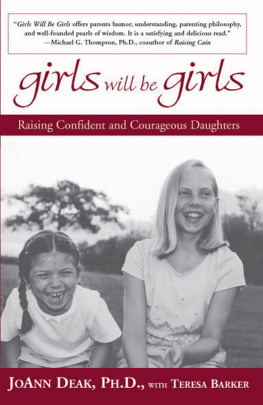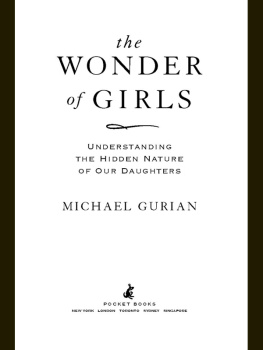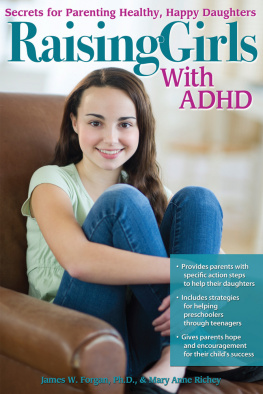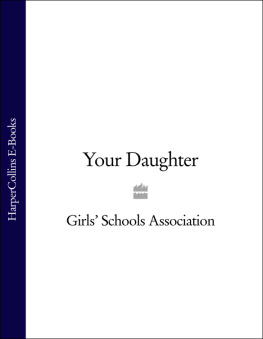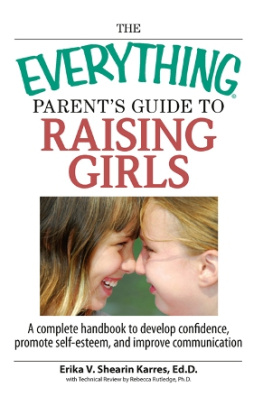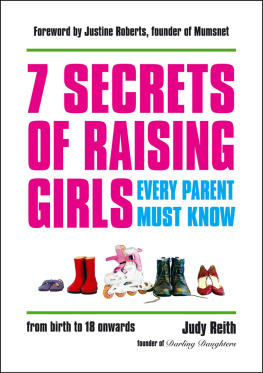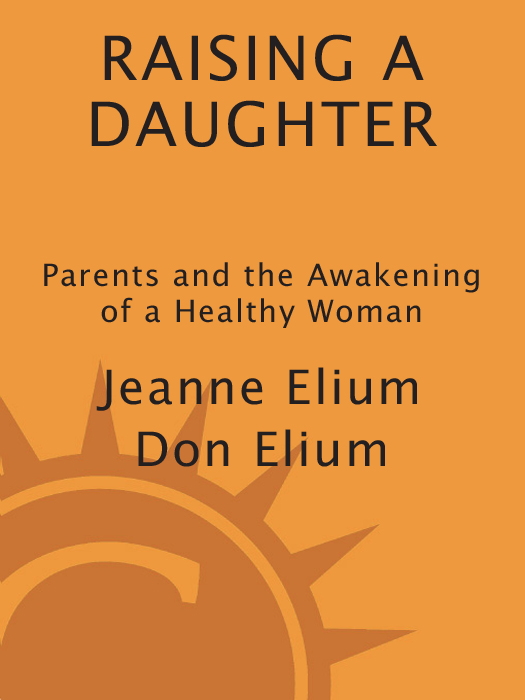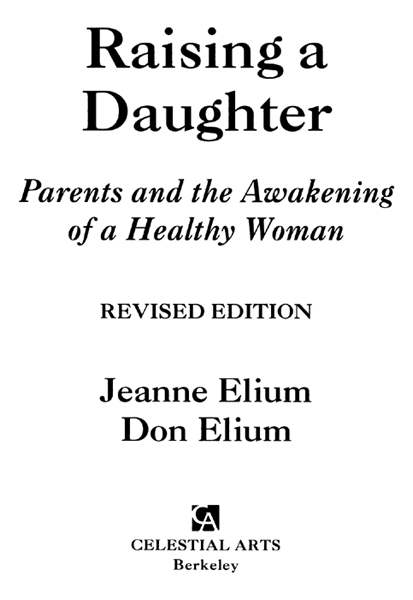Copyright 1994, 2003 by Jeanne Elium & Don Elium
All rights reserved.
Published in the United States by Celestial Arts, an imprint of the Crown Publishing Group, a division of Random House, Inc., New York.
www.crownpublishing.com
www.tenspeed.com
Celestial Arts and the Celestial Arts colophon are registered trademarks of Random House, Inc.
Library of Congress Cataloging-in-Publication Data is on file with the publisher.
eISBN: 978-0-307-77906-9
v3.1
To our children Heidi and Matthew:
May you walk your own paths,
with confidence and pride,
especially when it differs from ours.
CONTENTS
P ART I Girls and Women
The Challenge of Being Female
C HAPTER F OUR The Cultural Force
A Question of Competence
C HAPTER S IX Fences: Developing Healthy
Personal Boundaries
C HAPTER S EVEN Inner Guidance System:
Feeling, Thinking, and Willing
C HAPTER N INE The Watch Me! Years:
Birth to Seven
C HAPTER T EN The I Can Do Anything! Years:
Eight to Twelve
C HAPTER E LEVEN The You Just Dont Understand Me! Years:
Thirteen to Seventeen
C HAPTER T WELVE The Im Trying to Find Myself Years:
Eighteen to Twenty-nine
The lines from The Invocation to Kali and Now I Become Myself are reprinted from Collected Poems (19301933) by May Sarton, by permission of W. W. Norton & Company, Inc. Copyright 1993, 1988, 1984, 1980, 1974 by May Sarton.
The lines from The Girl Within by Emily Hancock are reprinted by permission of E.P. Dutton. Copyright 1990 by Emily Hancock.
For Strength from Prayers and Graces by Rudolf Steiner, translation reprinted with kind permission of Floris Books.
The lines from Child Moon are reprinted from Chicago Poems by Carl Sandburg, by permission of Hartcourt Brace & Co. Copyright 1986 by Carl Sandburg.
The excerpt from the play Quilters by Molly Newman and Barbara Damashek is reprinted by permission of Helen Merrill, Ltd. All amateur and professional stage performance rights (other than first class rights) to Quilters are controlled exclusively by Dramatists Play Service (DPS), 440 Park Avenue South, New York, NY 100 16. No professional or non-professional performance of the play (excluding first class professional performance) may be given without obtaining in advance the written permission of DPS, and paying the requisite fee. Inquiries concerning all other rights to Quilters should be addressed to the authors agent, Helen Merrill, Ltd. 435 West 23rd Street, Suite 1A. New York, NY 10011.
ACKNOWLEDGMENTS
We gratefully thank our resourceful agent Peter Beren, for his patient, sympathetic ear and expert advice; our publisher David Hinds, for his support and leadership, managing editor Veronica Randall, for her encouragement, relentless drive, enthusiasm, and support, Neave Higgins, for her expert nit-picking and follow through, Victor Ichioka, for his beautiful text design, and the other wonderfully helpful people at Celestial Arts; Audrey Johnson, one of the fastest editors in the world; research assistant Laura Kennedy, detective extraordinaire; and our friend Bob Kliger, whose Macintosh support saved the day. We also gratefully acknowledge the people at Touchstone Counseling Services; master therapist Landry Wildwind, Wally Meerschaerdt, Audrey Silverman Foote, Bruce Silverman, Fred and Sherri Glueck; and our great neighbors on Margaret Drive.
We are extremely grateful to our clients, colleagues, friends, and families who shared personal accounts of their lives with us. To protect their privacy, names, anecdotes, and case histories have been changed. We acknowledge those whose courage to tell their stories allows us all to benefit from their tragedies and triumphs.
For this second edition, we thank our readers who took the time to tell us how this book has helped them. We were especially touched by the tattered copies brought to us to be signed. I, Jeanne, am deeply grateful to my daughter, Heidi, for giving her heart and her time to help me reveal the whole truth about my mothering journey. Many thanks for the continued dedication of our agent, Peter Beren, and to Veronica Randall, a special person and a superb editor. We continue to remember David Hinds with warmth and gratitude for his support of our books. We miss him very much. And to our family and friends with much love: Thank you for being there.
FOREWORD
Taking in our daughters voices forces women to
confront what was pushed underground.
Elizabeth Debold,
Mother Daughter Revolution
Raising A Son was our initial endeavor in the publishing world, and the first time that we presented our ideas and experiences about boys to a worldwide audience. We were delighted and a little surprised at its success. Everyone, it seemed, worried and wanted advice about their sons. When our readers wanted to know when we would write Raising A Daughter, my heart sank. I felt that I could offer insight into parenting boys because of my work with the Mens Movement, my gender studies, and the fact that Don and I were raising a son of our own. A book about daughters, however, touched a very raw and painful place within me. Every time I considered such a project, a lump formed in my throat. No, I have no right to write a book about raising daughters, a strong inner voice always answered. But what about the next step in a writing career that I loved. Pressure to write Raising A Daughter came from many directions, and I surrendered, knowing that I was opening myself to painful memories and unfinished emotional work.
You see, after her father and I divorced, I became my daughters noncustodial parent. I moved out, leaving her to live with her father. This decision was not an easy one, and I felt a deep anguish over my effectiveness at nurturing my daughter, agonizing when I lost patience, felt bored with childrens games, or wanted time to myself. I withdrew from my husband, whose natural nurturing ability made me feel left out, inadequate, a failure. Had someone told me that I was holding myself to an impossibly high standard, I might have been more accepting of my parenting insecurities and self-criticisms. How was I to know that having children, especially having a daughter, almost always brings up unresolved childhood issues for a mother? As I struggled to meet my infant daughters normal, insatiable need for nurturing, the unmothered child within me cried out for the same.
At the time, I did not know that unmet childhood needs made it hard for me to mother, that my own mothers chronic poor health made her unavailable when I needed her the most. When she was hospitalized and away from the family for almost a year, no one explained to me where she was, or that I was not to blame for her illness and absence. As an adult, I did not understand the dark, childish rage that occasionally gripped me, leaving me lonely and frightened that I was losing my sanity. How could I be so unhappy? I had the most beautiful baby, a kind husband, and a lovely home. My hunger for attention, safety, understanding, and love swallowed me whole, and nothing outside of myselfmy husband, my daughter, my homecould fill the yawning hole that consumed me. Clumsily, I began the long journey to find the mother within myself, who would sustain me enough to mother my own daughter.


